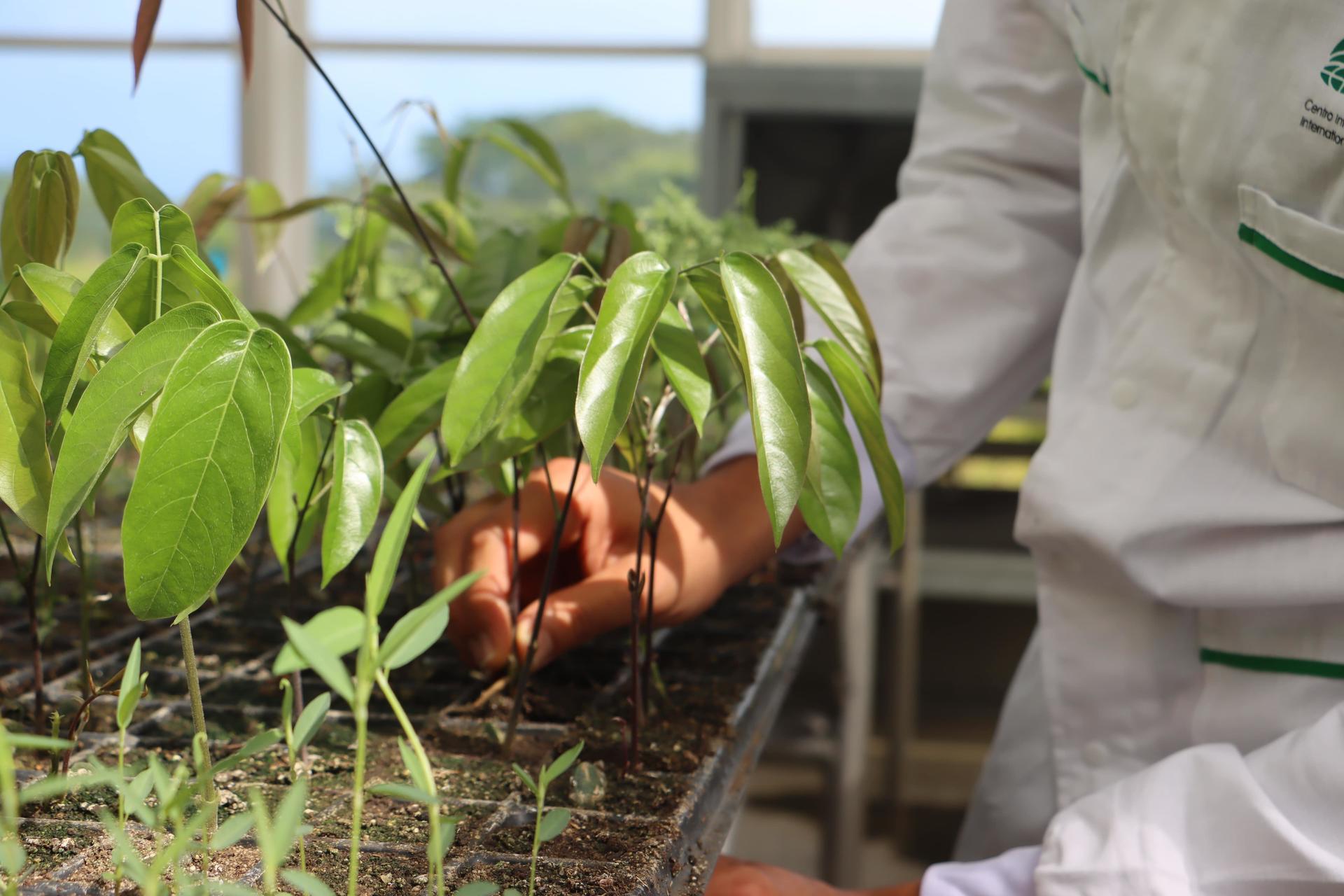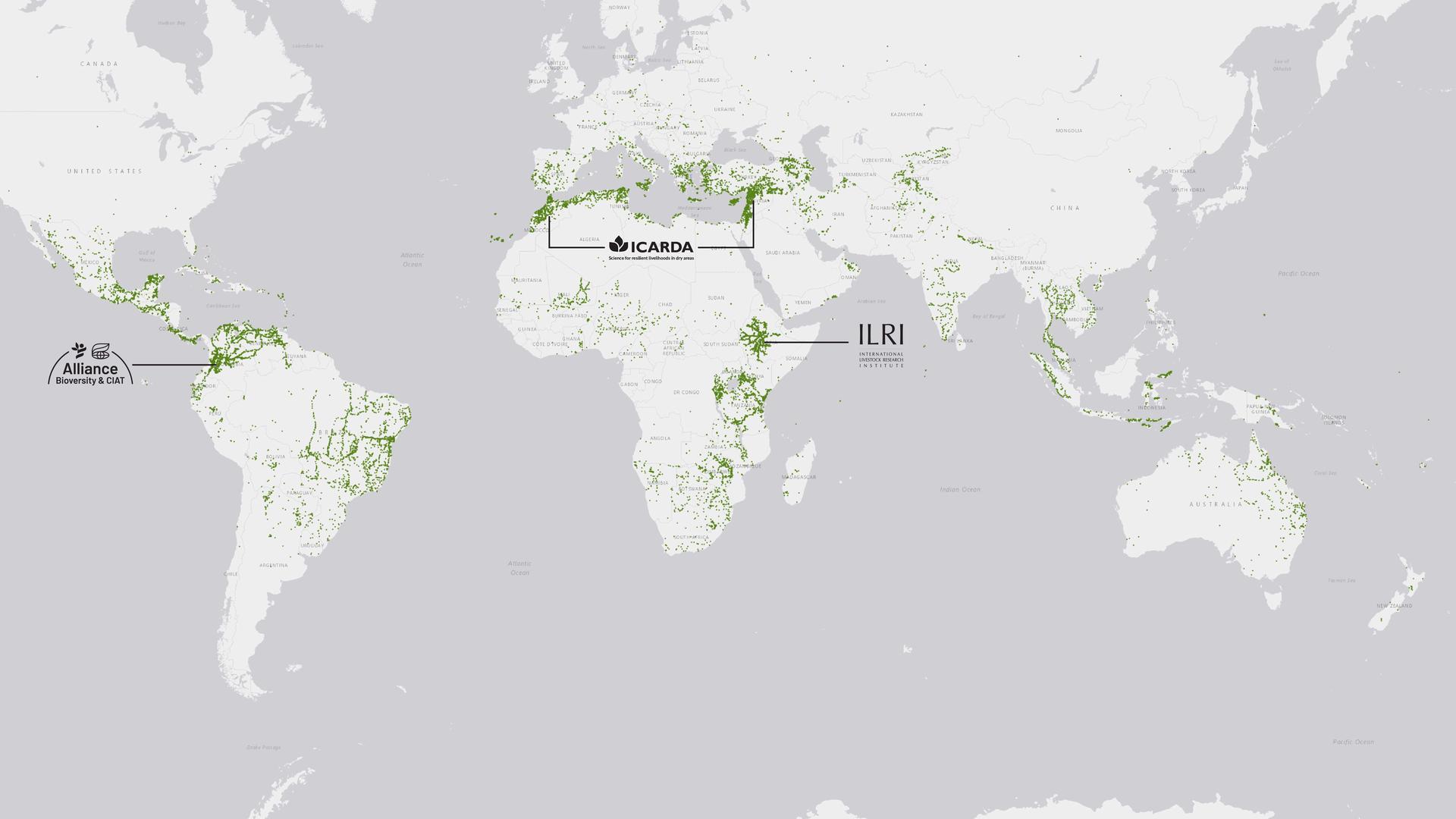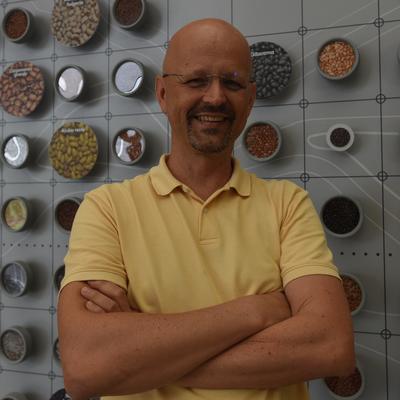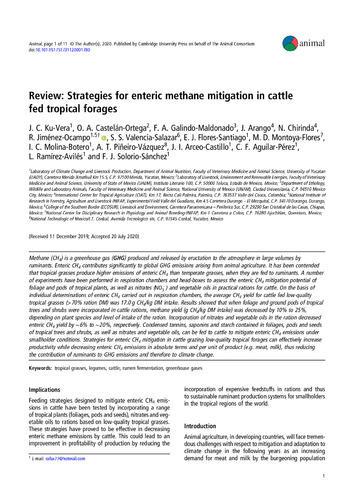Low-Methane Forages (LMF)

The project aims to identify and/or develop high-yielding, nutritive, and drought tolerant forages that not only improve animal productivity but also decrease enteric methane (CH4) emissions due to enrichment with certain plant compounds that exhibit anti-methanogenic property. Specifically, the project aims to: (i) screen existing forages from CGIAR Genebanks for low-methane production; and (ii) identify accessions/cultivars with significant levels of anti-methanogenic compounds (AMCs) that lower CH4 production.
Project Name: Using forages for taking a bite out of livestock methane emissions in the Global South
Start and end date: October 2023 - October 2028
Geographic area, countries:
The Alliance, ICARDA & ILRI collectively conserve almost 71,000 forage accessions, most of them collected in the Global South.

Alliance of Bioversity International and CIAT (Alliance) in Colombia
International Livestock Research Institute (ILRI) in Ethiopia
International Center for Agricultural Research in the Dry Areas (ICARDA) in Lebanon
Context
While carbon dioxide increase in the atmosphere often takes the spotlight when talking about climate change, methane (CH4) with its significantly higher warming potential, poses a substantial concern. With 42% of methane emissions originating from agriculture, particularly through enteric fermentation in livestock, finding solutions becomes imperative. However, the critical role of livestock farming in economies of the Global South and in food and nutrition security cannot be overlooked. To tackle this issue, an innovative project led by the Alliance of Bioversity International and CIAT (Alliance), in collaboration with two other CGIAR Centers (ICARDA, ILRI) and Genebanks, plus the Global Methane Hub, aims to identify and develop low-methane forages and prepare for creating enabling conditions for their deployment in the Global South.
By screening thousands of forage accessions for compounds that can reduce methane emissions (known as AMCs), the project seeks to mitigate climate change while ensuring food security and livelihoods for millions of farmers. Supported by the Bezos Earth Fund (BEF) and the Bill & Melinda Gates Foundation (BMGF), this project aims to contribute towards achieving a 1.5% reduction in enteric methane emissions globally by 2030. With a pledge of $28 million over five years, the project promises to harness the agricultural diversity preserved in CGIAR Genebanks to combat climate change while enhancing food and nutrition security.
Key activities
Discovery
Identify accessions from the CGIAR Genebanks containing potent AMC, by screening approximately 6,000 out of 71,000 CGIAR Genebanks’ forages accessions, using a combination of exploratory (in vitro assays) and metabolomics approaches, and confirm, through in vivo assays, the biological activity of identified AMC candidates, through research activities organized through three work packages and implemented by three working groups:
- Genebanks: Produce plant material for pilot experiments while harvesting seeds for subsequent multiplication of promising accessions. Identify the molecular structure and tentative mode of action of AMCs from selected accessions that were identified through in vitro screening and in vivo validation.
- In vitro screening: Batch in vitro assays and metabolic profiling methods, assessed and validated for large-scale screening of germplasm collections. As a result of this, up to 200 candidate accessions will be identified.
- In vivo validation: This group will lead the development and operation of respiration chambers and SF6 (sulfur hexafluoride) tracer equipment for field trials testing to validate in vitro assay results, established at three project sites; infrastructure also to be made available for testing other feed alternatives relevant to the Global South, validating up to five forage accessions with anti-methanogenic activity.
Development
Forages with high levels of validated AMC will be developed via two alternative pathways:
(i) Directly promote AMC-rich forage legumes into livestock systems identified as high priority for methane emission reduction.
(ii) enhance AMC levels of widely-used forage grass cultivars through conventional breeding and/or gene editing.
Deployment
Preparing to scale up the adoption of the most promising AMC-rich cultivars, by
(i) building models for monitoring, reporting and verifying the effectiveness, agronomic performance and methane production of AMC-rich forage grasses evaluated through field trials
(ii) designing enabling conditions for carbon projects with AMC-rich forages and served as input to accessing climate finance, such as carbon markets, blended finance, and Green Climate Fund (GCF) financial mechanisms.
Partners
Funders
Budget
$28 million USD in funding has been secured through contributions from Bezos Earth Fund ($15.5 million) and Bill & Melinda Gates Foundation ($12.5 million)
Principal Investigator
Jacobo Arango
Senior ScientistWork Package Leaders

Peter Wenzl
Lead, Genetic Resources Program
Alejandra Marín
Research Specialist
Ciniro Costa Jr
ScientistProject Manager

Alejandra Suárez
Project ManagerScientists (Alliance)

Paul Chavarriaga
Gene Editing Platform Leader
Rosa Jauregui
Tropical Forages BreederJuan Andres Cardoso
Plant ecologist and physiologist
Ricardo Gonzalez-Quintero
Postdoctoral Researcher, Environmental Modeling of Livestock SystemsScientists (ILRI)
Technical Advisors
- Idupulapati Rao
- Stefan Muezel
- Juan Ku-Vera
- Karen Beauchemin
- Hayden Montgomery


